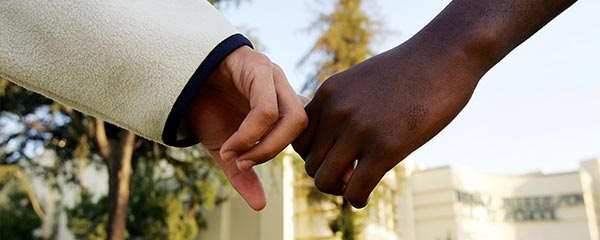Story Highlights
- Reduced majorities perceive equality of jobs, housing in own community
- Less than half now see equality in hiring for racial minorities in U.S.
- Affirmative action receives broader support than in early 2000s
WASHINGTON, D.C. -- Americans are less certain today than in the recent past that equality of economic opportunity exists for Black Americans. This is seen in slimmer majorities perceiving there to be equality for Black people in employment or housing in their own communities. Also, less than half of Americans believe racial minorities, generally, have the same job opportunities as White people in the U.S. And six in 10 now favor affirmative action programs for racial minorities, up from less than half a decade ago.
Job and Housing Fairness in Own Community
Currently, 55% of U.S. adults, similar to 58% in 2020 but down from over 70% as recently as 2011, say Black people have as good a chance as White people in their community to get any kind of job for which they are qualified. Forty-four percent now disagree with this sentiment, in line with the 42% recorded last year but otherwise the highest since Gallup's earliest readings, in 1963.
Similarly, 60% of Americans currently say Black people have the same chance as White people to get any housing they can afford. While roughly the same as last year's 63%, this is down from 67% in 2018 and around 80% from 1997 through 2015. Just under four in 10 (39%) now disagree that Black people have the same housing opportunities as White people in their community.
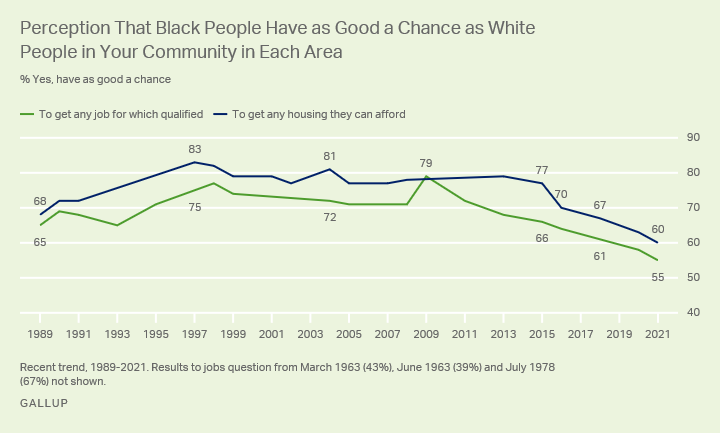
Line graph. Trends from 1989 to 2021 in Americans belief that Black people have as good a chance as White people in their community to get any job for which they are qualified and, separately, to get any housing they can afford. The broad pattern for both is that after about two-thirds were positive about equality in 1989, positive perceptions swelled to three-quarters or more in 1997 and remained near those levels through 2009. Belief that Black people can get any job for which they are qualified fell sharply by 2015 to 66%, while belief in equality of housing remained at 77%. But by 2019 both figures were down by more than 10 percentage points compared with 2009. They decreased further in 2021 with 60% believing Black people have the same rights in getting housing and 55% saying the same for jobs.
These findings are from Gallup's June 1-July 5 Minority Rights and Relations survey. The survey includes oversamples of Black and Hispanic Americans, weighted to their correct proportion of the population, to allow for reliable reporting of these groups' views.
Equality of Job Opportunity in the Country
Separately, the poll finds less than half of Americans -- 40% -- believing racial minorities, generally, in the country have equal job opportunities with White people, down from 45% in the last measurement in 2018 and from 53% in 2008.
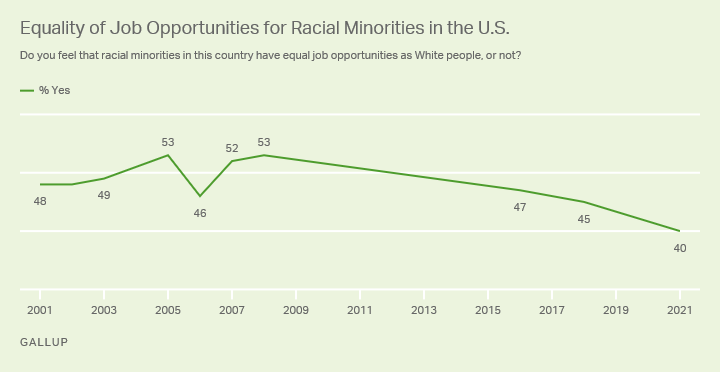
Line graph. Trend from 2001 to 2021 in Americans belief that racial minorities in the U.S. have equal opportunities with White people. The percentage believing this was 48% in 2001, rose to 53% in 2005 and was also 53% in 2008. It fell to 47% in Gallup's next measure in 2016, was 45% in 2018 and is 40% in 2021.
The majority of Americans, 59%, do not think racial minorities have equal job opportunities, as was the case in the 2016 (52%) and 2018 (54%) surveys.
Support for Affirmative Action at Two-Decade High
Along with diminished confidence in equality of opportunity in jobs and housing, 优蜜传媒finds increased support for "affirmative action programs" for racial minorities.
Sixty-two percent of adults now favor such programs, roughly tying the 61% found in 2018. But this is up from 54% in 2016 and is the highest in the trend since 2001. In that initial measure, 47% favored it. The question does not specify a type of affirmative action program, such as in the workplace or for college admissions; however, since the survey asks about racial fairness in jobs, but not education, respondents may be thinking more about jobs in answering it.
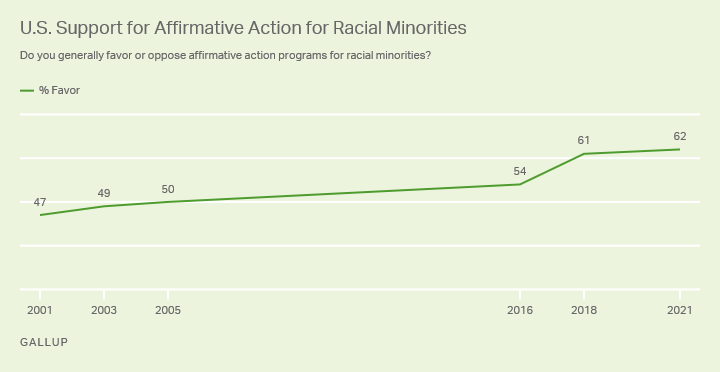
Line graph. Trend from 2001 to 2021 in Americans support for affirmative action programs for racial minorities. The percentage in favor was 47% in 2001 and 50% in 2005. It rose to 54% by the next measure in 2016 before jumping to 61% in 2018.
Black Americans Remain Distinctly Dubious About Equal Opportunity
Belief that racial equality exists in the job market has declined to a similar degree among Black, White and Hispanic Americans over the past decade.
However, significant racial gaps have persisted throughout Gallup's trend on this since 1963. Majorities of White Americans -- now 61% -- contrasted with less than half of Black Americans (now 31%), believe that Black people have the same chance as White people to get a job in their community.
The views of Hispanic Americans, which 优蜜传媒has tracked on this since 2004, have been much closer to those of White than Black Americans.
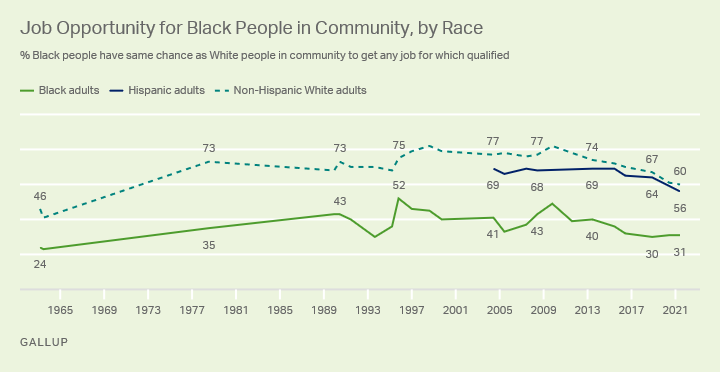
Line graph. Trend from 1963 to 2021 in perceptions by racial group about whether Black people have the same chance as White people in their community to get any job for which they are qualified. The trend among Black adults shows 24% perceiving equality of jobs opportunity in 1963. This rose to 35% in 1978 and 43% in 1989. It peaked at 52% in 1995 but subsequently fell to about 40% for much of the next decade. Since 2016 it has been closer to 30%. Meanwhile 46% of White adults perceived there was hiring equity in 1963. By the next measure in 1978, this had risen to 73% and it remained near that level for the next three decades. Since 2013 the percentage has declined from 74% to 60%. The trend among Hispanic adults, available since 2004, has been similar to that of White adults.
The trends by race are similar with respect to perceptions that Black people have the same chance as White people in their community to get any housing they can afford.
There have been 20 percentage point declines since 2013 in the percentages of Black and White Americans saying equal housing exists for Black people in their community. Belief in this has declined from 85% to 65% over this period among White adults and from 56% to 36% among Black adults.
As with White adults, a majority of Hispanic adults believe that equal housing opportunity exists for Black people in their community, but this declined from 77% in 2013 to 63% today.
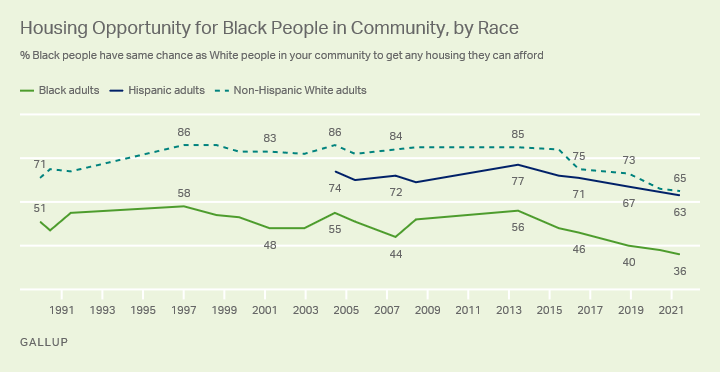
Line graph. Trend from 1989 to 2001 in perceptions by racial group about whether Black people have the same chance as White people in their community to get any housing they can afford. About half of Black Americans thought there was equality of housing in 1989, but after varying between 44% and 55% in the 2000s, this fell from 56% in 2013 to 40% in 2019 and 36% today. Agreement is much higher among White Adults with 71% in 1989 and approximately 85% from 1997 to 2015 saying Black people had equal housing opportunity. Since then, the rate has slid to 65%. Agreement among Hispanic adults has tended to be just a little lower than agreement among White adults.
Most of the decline since 2008 in Americans' belief that racial minorities in the country have the same job opportunities as White people is owing to shifts in White and Black adults' views. There has been little change in perceptions on this measure among Hispanic adults.
- Just 14% of Black Americans, down from a high of 24% in 2008, say racial majorities have the same job opportunities as White people in the U.S.
- For the first time, less than half of White Americans (46%) perceive equal job opportunities for racial minorities, down from a high of 60% in 2008.
- The 42% of Hispanic Americans who think equal job opportunities exist is within the 41% to 45% range seen most years since 2001.
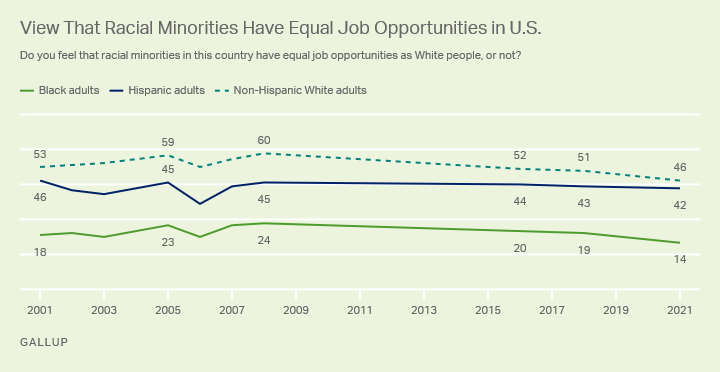
Line graph. Trend from 2001 to 2021 in racial groups belief that racial minorities in the country have equal job opportunities with White people. Views on this were fairly stable from 2001 through 2008 with more than half of White adults, just under half of Hispanic adults and between 18% and 24% of Black adults agreeing there were equal job opportunities. Since 2016, this view has declined among White adults (to 46%) and Black adults (14%), while Hispanic adults' perceptions have stayed about the same (now 42%).
Meanwhile, support for affirmative action has increased since 2016 among White and Hispanic adults, to 57% and 79%, respectively. Prior to that, fewer than half of White adults and just over six in 10 Hispanic adults favored it. At the same time, support declined among Black adults, from 75% in 2016 to 69% today.
The percentage of Black adults favoring affirmative action today is similar to what it was in the early 2000s, while the rates are significantly higher among White and Hispanic adults.
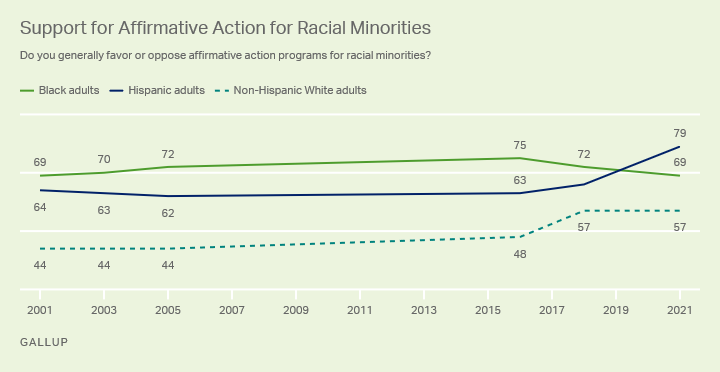
Line graph. Trend from 2001 to 2021 in racial groups support for affirmative action programs for racial minorities. Support has been fairly steady among Black adults over this time, ranging from 69% to 75%, including 69% in 2021. At the same time, support has increased among White adults from 44% in 2001 and 48% in 2016 to 57% since 2019. Most years, support among Hispanic adults has been in the low 60s, but this year it rose to 79%.
Bottom Line
Americans have become less confident in recent years that equality exists for Black people in the nation, as well as in their own community. Consistent with Americans' tendency to be more positive about local than national conditions in a number of areas, the majority (albeit diminished) still believe Black adults have the same chance as White people in their community to get jobs or housing, while less than half (now 40%) perceive racial equality exists nationally.
Some decline in belief that racial equality exists has occurred since 2019, spanning the upwelling of concern about racial justice sparked by George Floyd's death. But Americans were already becoming more skeptical following the peak of optimism in 2009 -- President Barack Obama's first year in office. In later years, particularly after 2013, public perceptions of Black-White relations began to deteriorate over several cases of unarmed Black men being killed during encounters with White police officers.
Coincident with these trends, majorities of Black, White and Hispanic Americans now share a favorable view of affirmative action. One thing that hasn't changed is the racial gap in attitudes about equal rights, with Black Americans maintaining a much more negative outlook than White Americans.
To stay up to date with the latest 优蜜传媒News insights and updates, .
Learn more about how the works.
View complete question responses and trends (PDF download).


